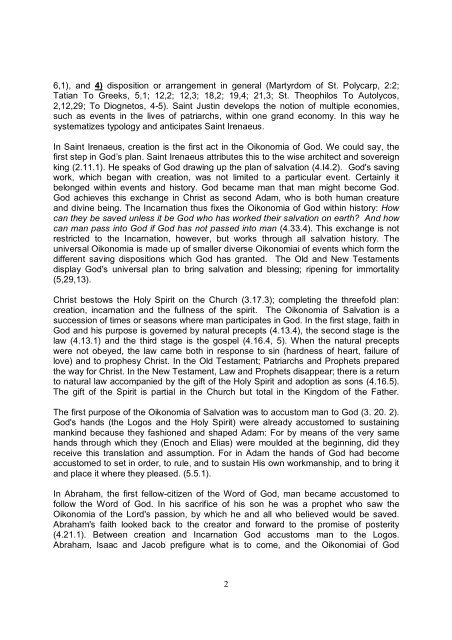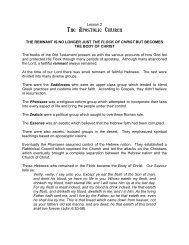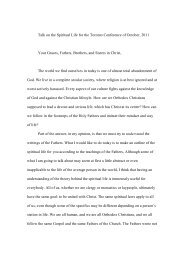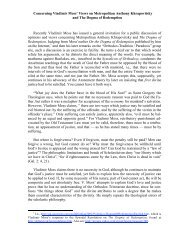According to the Scriptures - Saint Nektarios Greek Orthodox Church
According to the Scriptures - Saint Nektarios Greek Orthodox Church
According to the Scriptures - Saint Nektarios Greek Orthodox Church
Create successful ePaper yourself
Turn your PDF publications into a flip-book with our unique Google optimized e-Paper software.
6,1), and 4) disposition or arrangement in general (Martyrdom of St. Polycarp, 2:2;<br />
Tatian To <strong>Greek</strong>s, 5,1; 12,2; 12,3; 18,2; 19,4; 21,3; St. Theophilos To Au<strong>to</strong>lycos,<br />
2,12,29; To Diogne<strong>to</strong>s, 4-5). <strong>Saint</strong> Justin develops <strong>the</strong> notion of multiple economies,<br />
such as events in <strong>the</strong> lives of patriarchs, within one grand economy. In this way he<br />
systematizes typology and anticipates <strong>Saint</strong> Irenaeus.<br />
In <strong>Saint</strong> Irenaeus, creation is <strong>the</strong> first act in <strong>the</strong> Oikonomia of God. We could say, <strong>the</strong><br />
first step in God’s plan. <strong>Saint</strong> Irenaeus attributes this <strong>to</strong> <strong>the</strong> wise architect and sovereign<br />
king (2.11.1). He speaks of God drawing up <strong>the</strong> plan of salvation (4.I4.2). God's saving<br />
work, which began with creation, was not limited <strong>to</strong> a particular event. Certainly it<br />
belonged within events and his<strong>to</strong>ry. God became man that man might become God.<br />
God achieves this exchange in Christ as second Adam, who is both human creature<br />
and divine being. The Incarnation thus fixes <strong>the</strong> Oikonomia of God within his<strong>to</strong>ry: How<br />
can <strong>the</strong>y be saved unless it be God who has worked <strong>the</strong>ir salvation on earth And how<br />
can man pass in<strong>to</strong> God if God has not passed in<strong>to</strong> man (4.33.4). This exchange is not<br />
restricted <strong>to</strong> <strong>the</strong> Incarnation, however, but works through all salvation his<strong>to</strong>ry. The<br />
universal Oikonomia is made up of smaller diverse Oikonomiai of events which form <strong>the</strong><br />
different saving dispositions which God has granted. The Old and New Testaments<br />
display God's universal plan <strong>to</strong> bring salvation and blessing; ripening for immortality<br />
(5,29,13).<br />
Christ bes<strong>to</strong>ws <strong>the</strong> Holy Spirit on <strong>the</strong> <strong>Church</strong> (3.17.3); completing <strong>the</strong> threefold plan:<br />
creation, incarnation and <strong>the</strong> fullness of <strong>the</strong> spirit. The Oikonomia of Salvation is a<br />
succession of times or seasons where man participates in God. In <strong>the</strong> first stage, faith in<br />
God and his purpose is governed by natural precepts (4.13.4), <strong>the</strong> second stage is <strong>the</strong><br />
law (4.13.1) and <strong>the</strong> third stage is <strong>the</strong> gospel (4.16.4, 5). When <strong>the</strong> natural precepts<br />
were not obeyed, <strong>the</strong> law came both in response <strong>to</strong> sin (hardness of heart, failure of<br />
love) and <strong>to</strong> prophesy Christ. In <strong>the</strong> Old Testament; Patriarchs and Prophets prepared<br />
<strong>the</strong> way for Christ. In <strong>the</strong> New Testament, Law and Prophets disappear; <strong>the</strong>re is a return<br />
<strong>to</strong> natural law accompanied by <strong>the</strong> gift of <strong>the</strong> Holy Spirit and adoption as sons (4.16.5).<br />
The gift of <strong>the</strong> Spirit is partial in <strong>the</strong> <strong>Church</strong> but <strong>to</strong>tal in <strong>the</strong> Kingdom of <strong>the</strong> Fa<strong>the</strong>r.<br />
The first purpose of <strong>the</strong> Oikonomia of Salvation was <strong>to</strong> accus<strong>to</strong>m man <strong>to</strong> God (3. 20. 2).<br />
God's hands (<strong>the</strong> Logos and <strong>the</strong> Holy Spirit) were already accus<strong>to</strong>med <strong>to</strong> sustaining<br />
mankind because <strong>the</strong>y fashioned and shaped Adam: For by means of <strong>the</strong> very same<br />
hands through which <strong>the</strong>y (Enoch and Elias) were moulded at <strong>the</strong> beginning, did <strong>the</strong>y<br />
receive this translation and assumption. For in Adam <strong>the</strong> hands of God had become<br />
accus<strong>to</strong>med <strong>to</strong> set in order, <strong>to</strong> rule, and <strong>to</strong> sustain His own workmanship, and <strong>to</strong> bring it<br />
and place it where <strong>the</strong>y pleased. (5.5.1).<br />
In Abraham, <strong>the</strong> first fellow-citizen of <strong>the</strong> Word of God, man became accus<strong>to</strong>med <strong>to</strong><br />
follow <strong>the</strong> Word of God. In his sacrifice of his son he was a prophet who saw <strong>the</strong><br />
Oikonomia of <strong>the</strong> Lord's passion, by which he and all who believed would be saved.<br />
Abraham's faith looked back <strong>to</strong> <strong>the</strong> crea<strong>to</strong>r and forward <strong>to</strong> <strong>the</strong> promise of posterity<br />
(4.21.1). Between creation and Incarnation God accus<strong>to</strong>ms man <strong>to</strong> <strong>the</strong> Logos.<br />
Abraham, Isaac and Jacob prefigure what is <strong>to</strong> come, and <strong>the</strong> Oikonomiai of God<br />
2





